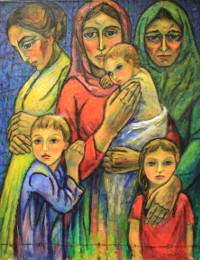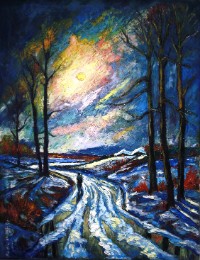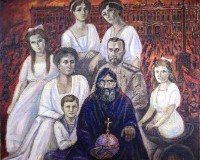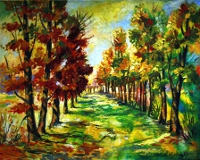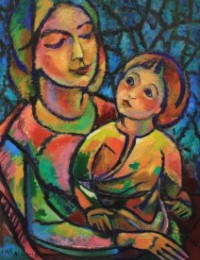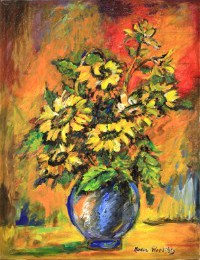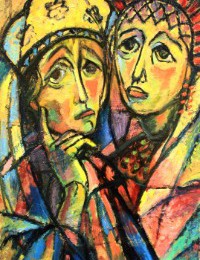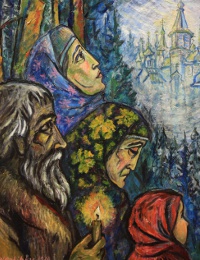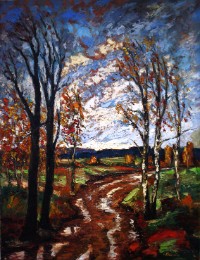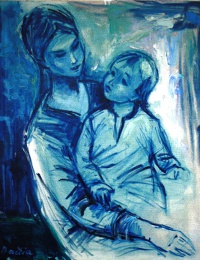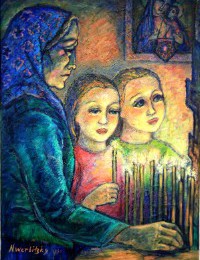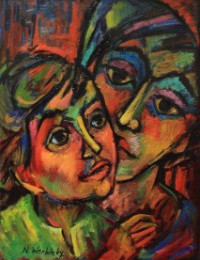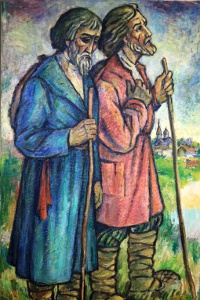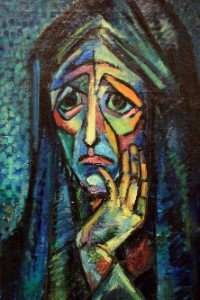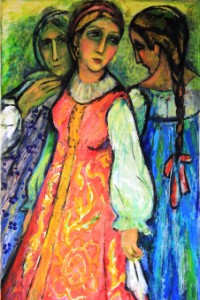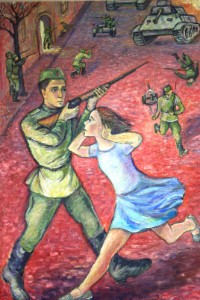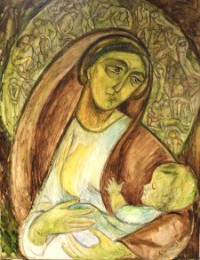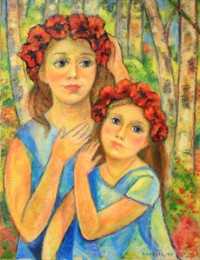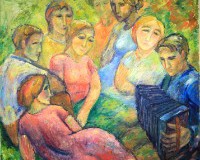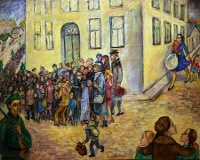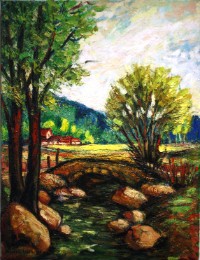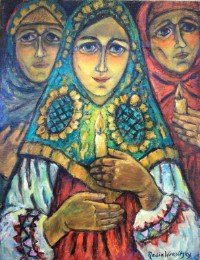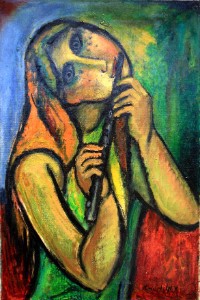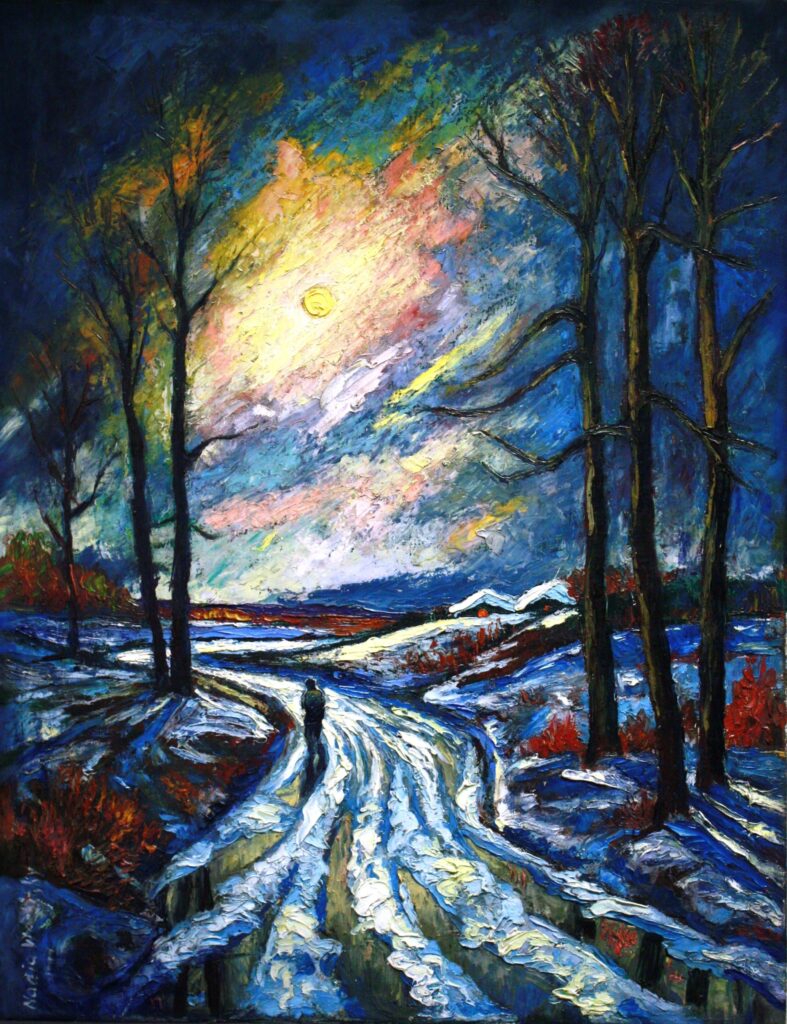Paintings by the American artist, Nadia Werbitzky
On this page you’ll find a sample of Nadia’s restored paintings.
You can click on an image to view it at a larger size and see the Two Regimes passage associated with it. There will also be an option to purchase a glossy print or canvas print of that painting.
You may also visit the Artist page to learn more about Nadia and her paintings.
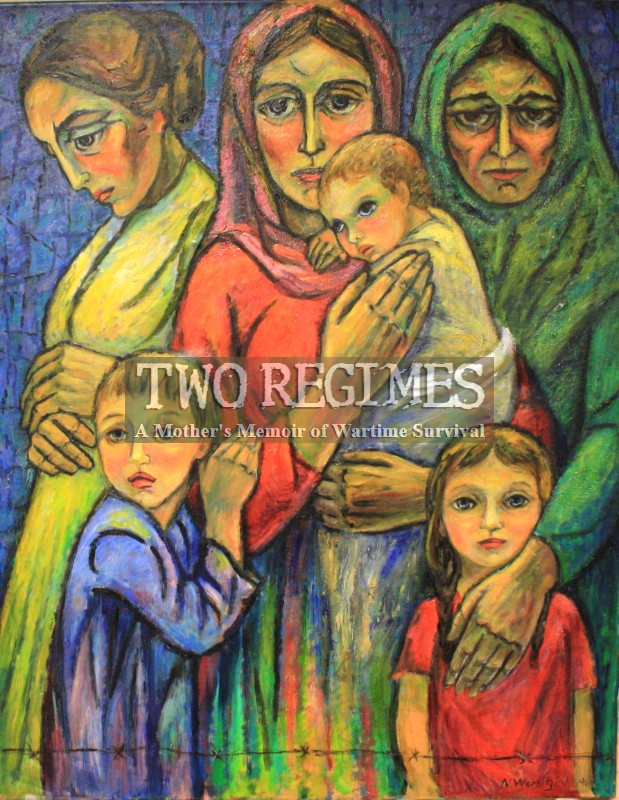
(This passage is from the 25th section of the Museum Exhibition)
Several people died in our building; the Jews had been killed, and the yard became empty. My children and I were sent to Germany.
At the Mariupol station we said good-bye to everything that had been dear to us. And we said good-bye forever. The railway car was filled to the limit and the doors were bolted shut with a padlock. We were unloaded at night and under guard, then transferred to a building with no access to a window or a place to put our things. We were taken to a large gymnasium with blackened windows. Inside were bunk beds: eighteen of them, four beds high. They were positioned so close together that there was barely enough room to squeeze by.
The camp had two exits. One set of gates was heavily guarded by police and led out to the street, while the other led to the factory. The entire camp was surrounded by barbed wire that was hung on posts and bent inward. The barracks were locked up for the night. Often we would be awoken several times for a head count by the police. The camp director was a meek, perhaps even kind, man. But above him, as in all camps, stood the dreaded Gestapo agent.
Our camp called him “Tiny” due to his insignificant height. Everyone, including the German workers and the police, trembled whenever they were around him. Once a week he would send allegedly suspicious individuals to the Wupperthal Prison, from which they would never return.
Glossy print (18″ X 24″)
$35.00
Canvas print (40″ X 32″)
$700.00
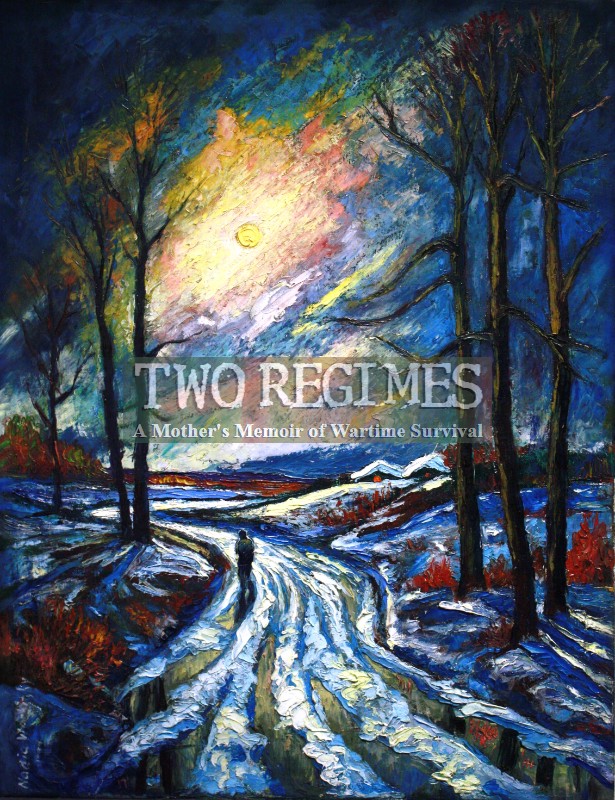
(This passage is from the 6th section of the 5th Grade Exhibition)
My husband returned after serving his six-year sentence. He returned to find himself again without work, under the surveillance of the NKVD, and without friends. Old friends had also been arrested, while others were too afraid to continue a friendship. He did manage to find someone, but sometimes he would come home tipsy from drinking. And that is how it continued until the catastrophe, which destroyed our family completely.
Glossy print (18″ x 24″)
$35.00
Canvas print (26″ X 20″)
$460.00
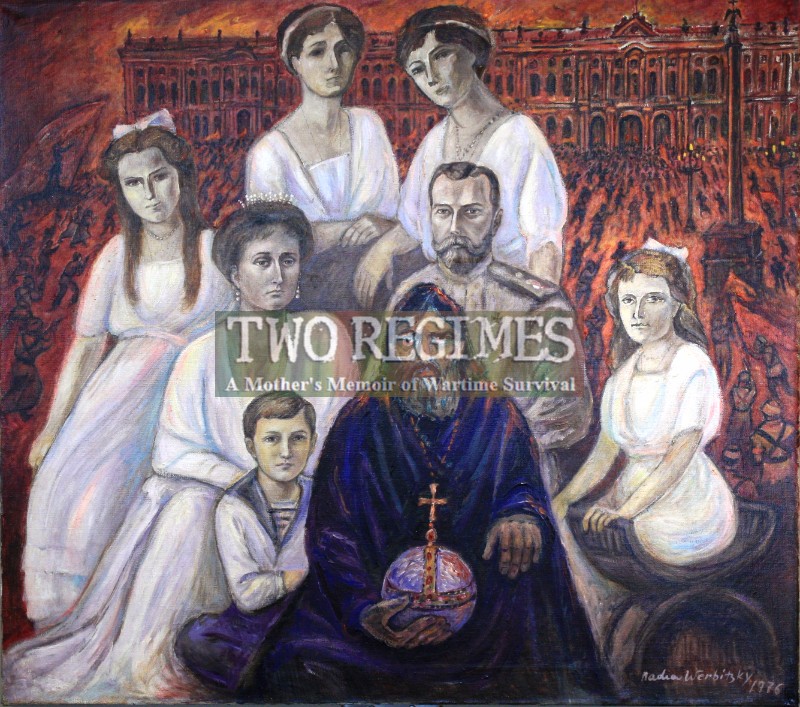
(This passage is from the 7th section of the 7th Grade Exhibition)
The arrest policy now expanded to include the Ukrainians and the Poles. The innocent were dragged away. In every family there was heartbreak and tears. The Bolsheviks forgot at what costs they came to power.
Glossy print (18″ x 24″)
$35.00
Canvas print (32″ X 36″)
$512.00
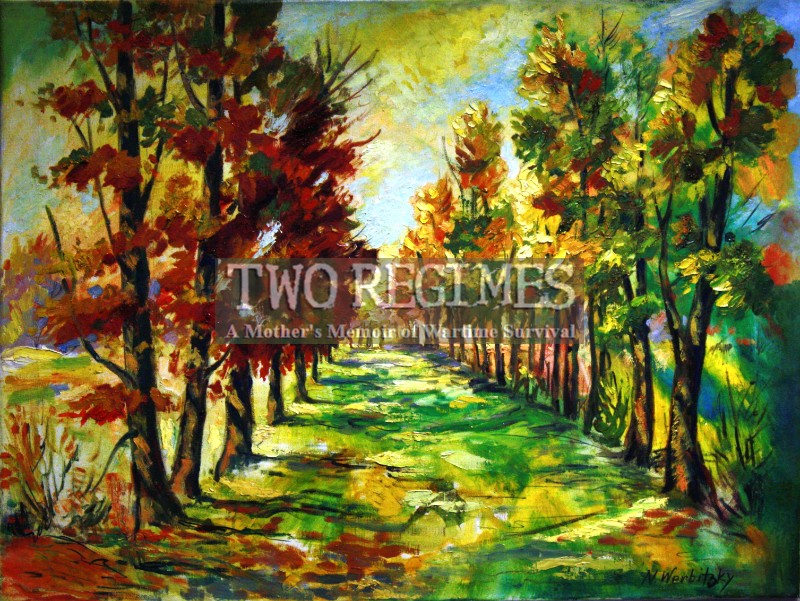
(This passage is from the 3rd section of the 7th Grade Exhibition)
The city was beginning to experience unemployment. However and since my husband was unable to find work, we decided to move on to Mariupol. This came at a time when the New Economic Policy (NEP) was coming to an end. Although the State was struggling to organize collective farms, there were still many free merchants (chastniki) working at the Mariupol market.
Because of the high unemployment, no one had money. We found ourselves spending the last of our rubles and looking toward an uncertain future. While searching long and hard for work, my husband registered at the unemployment office, as required. Almost immediately he was arrested and then reminded about statements that he made about those little “long-noses.”
Glossy print (18″ x 24″)
$35.00
Canvas print (24″ X 32″)
$560.00
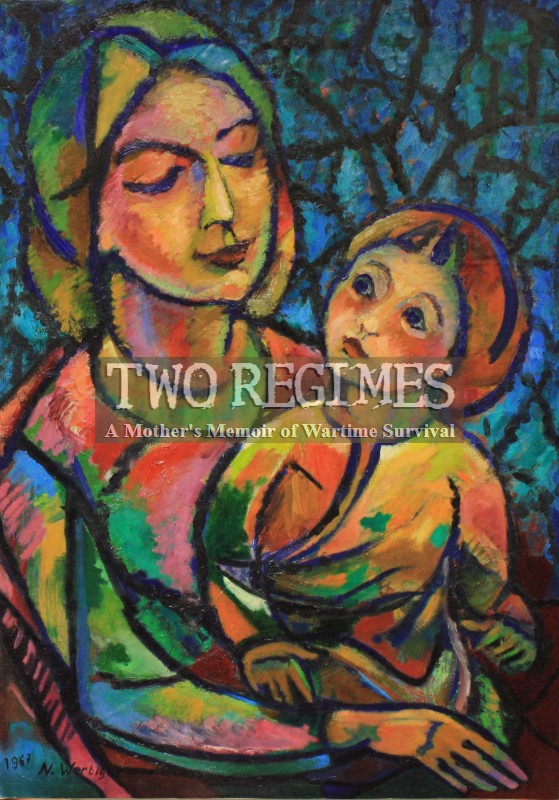
Glossy print (18″ x 24″)
$35.00
Canvas print (28″ X 20″)
$480.00
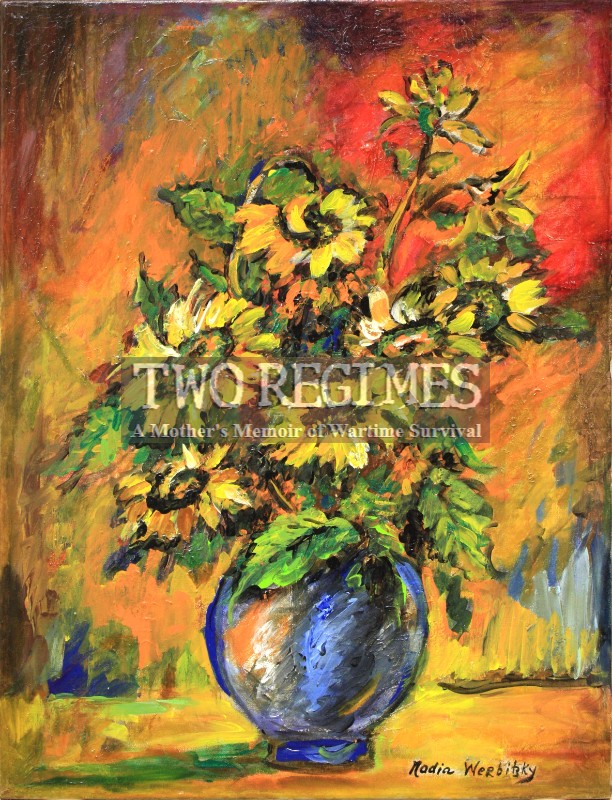
Glossy print (18″ x 24″)
$35.00
Canvas print (26″ X 20″)
$460.00
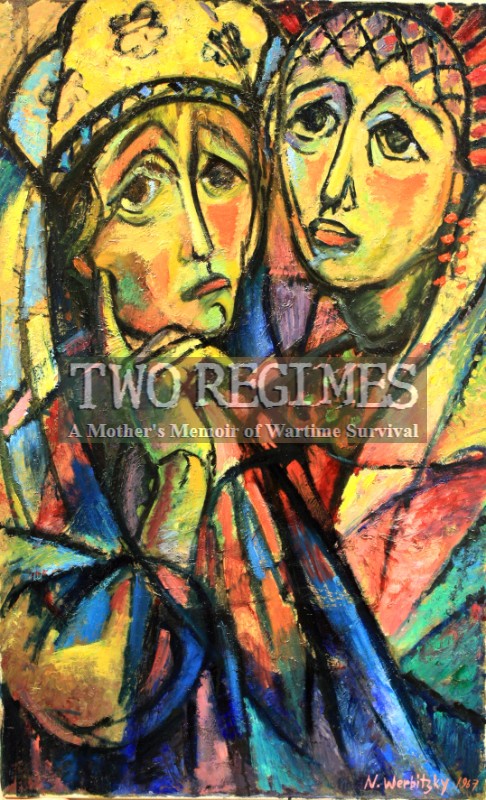
(This passage is from the 22nd section of the Museum Exhibition)
The trains, it was said, were being bombed including the Red Cross trains carrying the wounded. Under the cover of darkness, Party members and their families were evacuated on ships. But the rest had no place to go.
Petrovitch’s wife, who lived in the main apartment, came in one day and offered to sell me some coal for heating. Since I had no money, she said, “Then move into our apartment and take care of our furniture.” Without thinking twice, I agreed, and we took over their beautiful furnished flat. The coal, which I could not buy, was divided up among the neighbors.
In the cellar, where the coal was stored, we found some passports. Although damaged by water, the names and photographs were still legible. It appears that Petrovitch was an NKVD agent, otherwise, why these passports? Evidently, people were put in the cellar and their passports were thrown in the furnace. I still remember the photographs of the two young women. Why were they taken and for what reason?
Glossy print (18″ x 24″)
$35.00
Canvas print (32″ X 20″)
$500.00
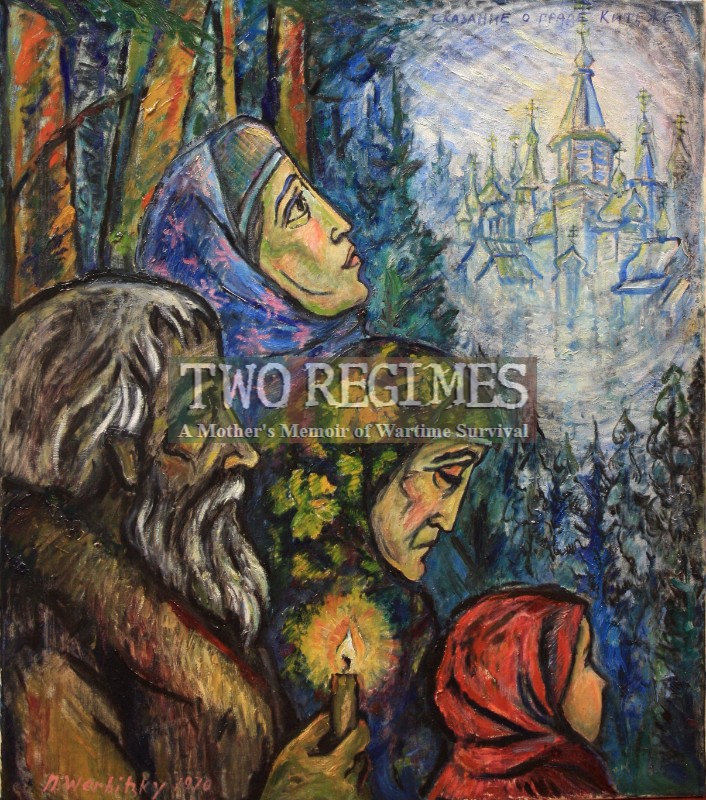
(This passage is from the 16th section of the Museum Exhibition)
In 1932, our city was experiencing hunger and began to die. The villages still had bread, but were unaware that they too would soon suffer the fate of the city-dwellers.
The policy of taking the grain and bread from farmers began in the 1920s. When the State later realized that it couldn’t do without the farmers, it introduced the New Economic Policy (NEP). With the arrival of the Stalinist era, however, the State began a policy of extreme and repressive measures with the purpose of organizing the collective farms. Sweeping every last grain from the bins of the peasants, the authorities then sent them away to Siberia and the Solovki Islands. Without considerations to the sick, the aged, or the children, and without even allowing time to say good-bye, the police would arrive and, at gunpoint, force these people into trucks—ignoring the wailing, the crying, and the moans.
Glossy print (18″ x 24″)
$35.00
Canvas print (31″ X 27″)
$575.00
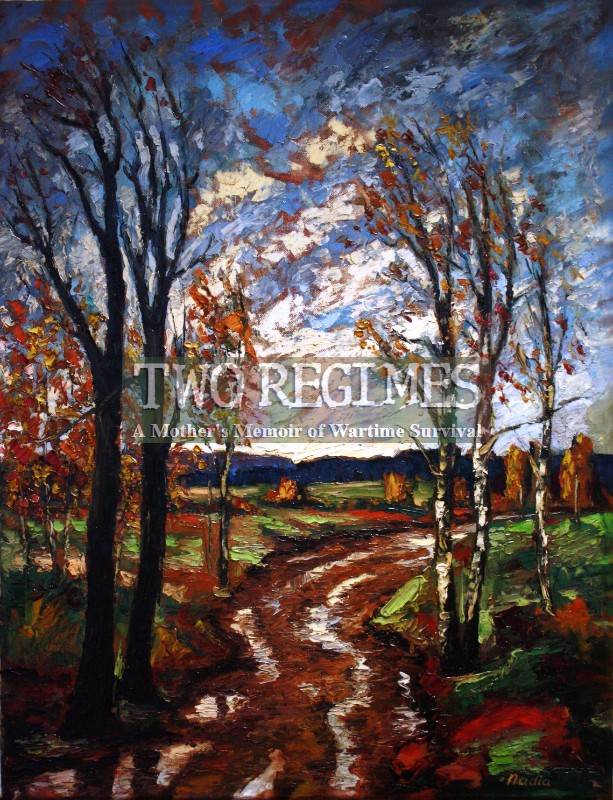
Glossy print (18″ x 24″)
$35.00
Canvas print (26″ X 20″)
$460.00
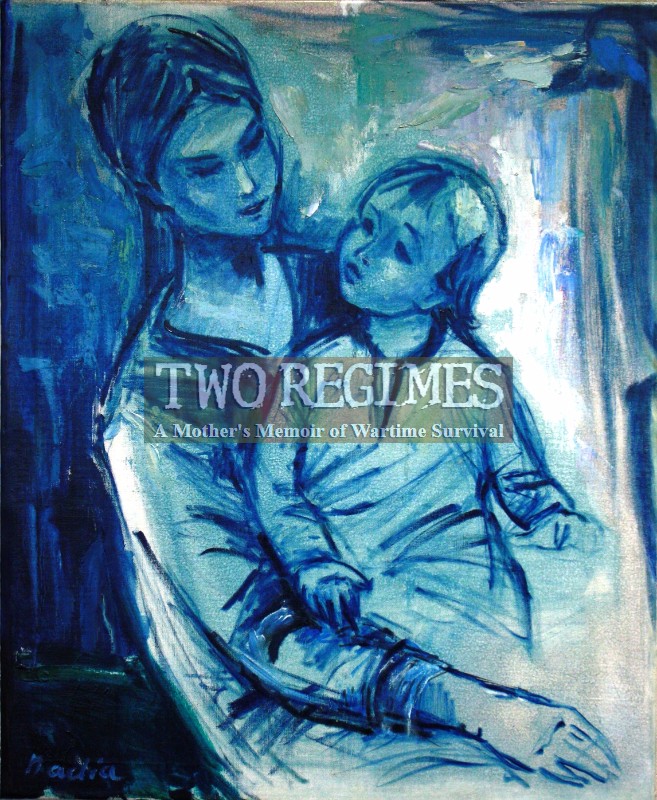
(This passage is from the 6th section of the Museum Exhibition)
My husband soon began receiving wages and rations. I began teaching reading and writing to the village children. Pereprava did not have schools and even half of the adults were illiterate. Since I did this for free the students would sometimes bring me fresh fish or a pitcher of milk as payment so we were not completely destitute. At night while sitting by the stove and listening to the howl of the wind, we felt content and warm, hoping that no one would find out about us.
Glossy print (18″ x 24″)
$35.00
Canvas print (22″ X 18″)
$400.00
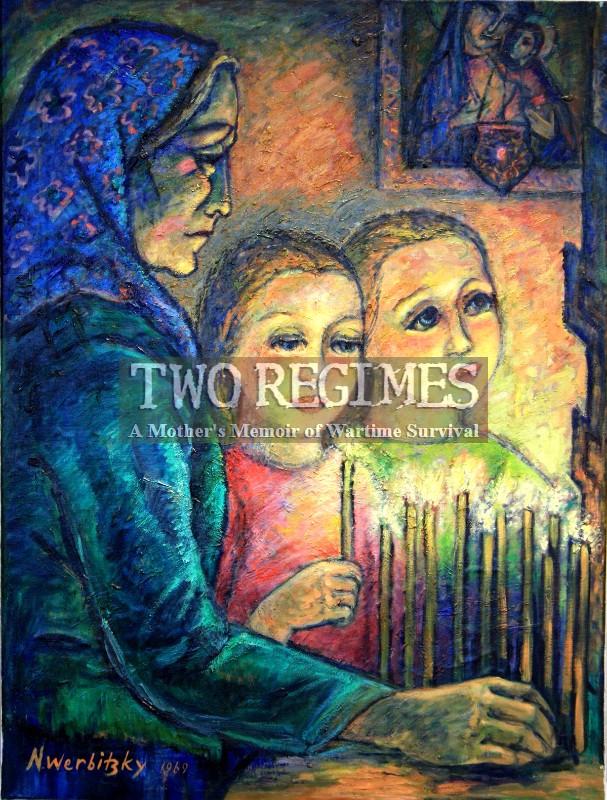
(This passage is from the 6th section of the Museum Exhibition)
The marketplace had become almost empty of goods. A dirty piece of lard costs a ruble here. So does a medium-sized potato; and there is no cabbage. How can a Russian survive without borscht*?
Glossy print (18″ x 24″)
$35.00
Canvas print (32″ X 24″)
$560.00
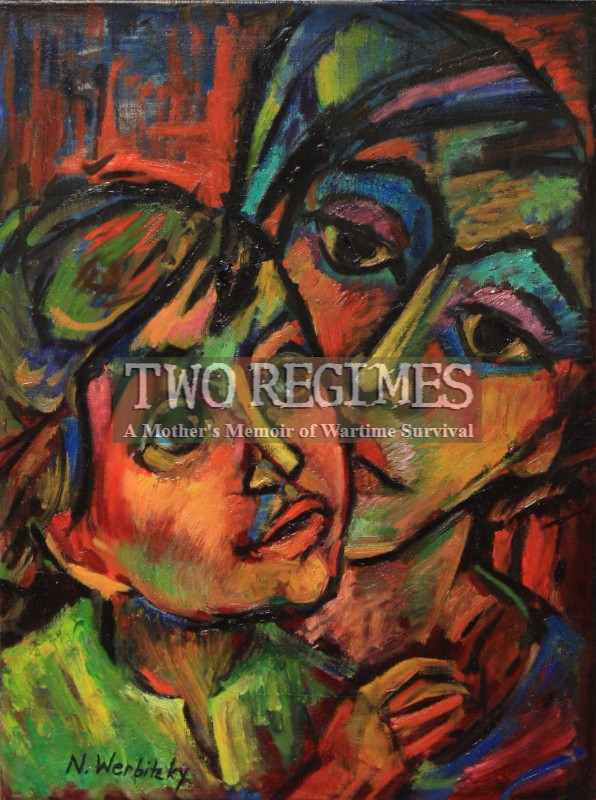
(This passage is from the 17th section of the High School Exhibition)
One of the men in the prison was a German soldier, a deserter. He had been arrested because he went home to visit his sick wife and children without permission. He told us about the battle at Stalingrad and the German defeat on all of the Fronts, the armies destroyed and retreating. He said that half of Germany was already in American hands.
We listened in amazement, not believing our ears, but saying nothing. We did not want to miss a single word of his account. Throughout our entire four-year imprisonment we had not known what was happening on the military front. We stood for hours in the hallways with the other prisoners, talking, without being told to return to our cells.
Glossy print (18″ x 24″)
$35.00
Canvas print (24″ X 20″)
$420.00
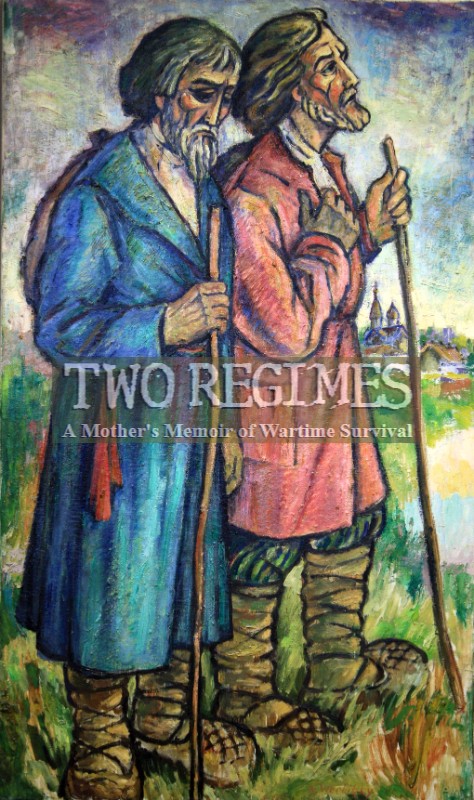
(This passage is from the 12h section of the High School Exhibition)
The Germans tore Poland to pieces in a few days, descending on the country like an evil hurricane. The Poles ran toward the border for safety and were met there with bayonets. Twelve thousand of the Polish army’s finest had to take refuge in Katyn forest.
Nor was Ukraine spared the fate of Poland. The German vultures swept down on the Ukrainian soil, crumbling and burning everything in their path and bringing death.
With the war came the flood of refugees. As soon as the first bomb was dropped on Poland, bread and all other products disappeared from the market. To receive a quarter of a pound of margarine, I stood in a line with seven thousand people, and behind me there were as least as many. We stood day and night and got nothing.
Glossy print (18″ x 24″)
$35.00
Canvas print (40″ X 24″)
$460.00
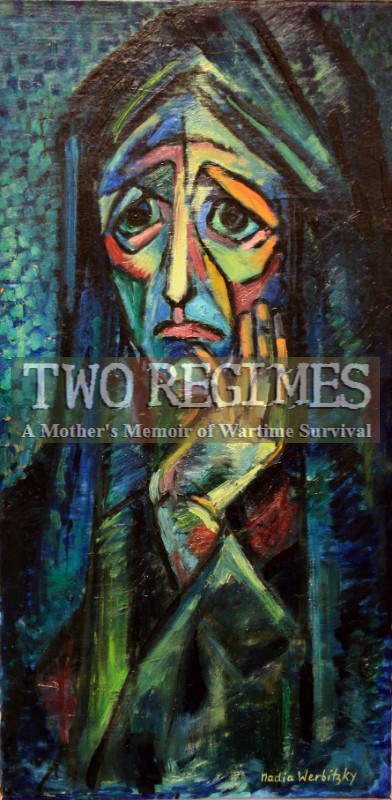
(This passage is from the 14th section of the Museum Exhibition)
The state proceeded to round up animals into herds, moving them to the state yards, or directly to slaughter. On the way the animals were not fed or milked and after enduring near starvation at home, they would drop and die. The wagon behind the herd would then become filled with the carcasses of this cruel slaughter.
The animals were not fed because they were considered as confiscated property for unpaid fines and taxes, and the state budget did not allow for their upkeep.
For the first time in my life, I actually saw a cow cry. An elderly couple was ordered to give up their cow to the state. “We cried the whole way,” the old man said. “My wife was hugging and stroking her Mashka,” and Mashka seemed to understand where she was being taken. “You see, she’s still crying.” And sure enough, I could see tears coming from the eyes of the cow.
Glossy print (18″ x 24″)
$35.00
Canvas print (32″ X 16″)
$340.00
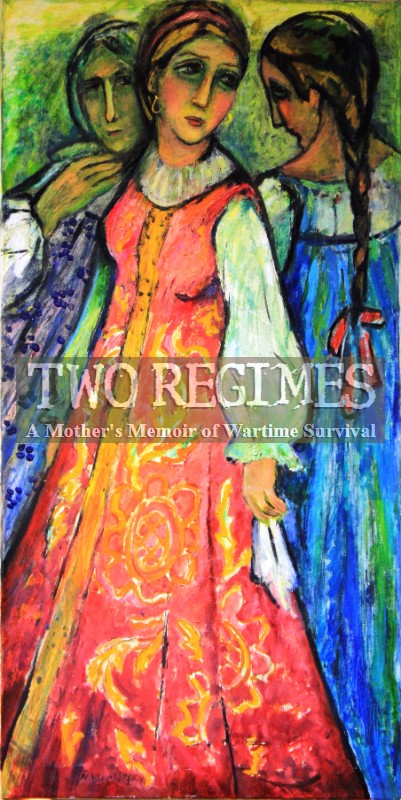
(This passage is from the 10th section of the 8th Grade Exhibition)
Work was stopped at the Azovstal plant after the initial attack; machines were removed and specialists evacuated. After Azovstal, another even larger plant, the Illich, stopped production Smaller factories and shops also began closing. The result was that in virtually one day, one hundred fifty thousand people lost their jobs. How were we now going to feed our children, the elderly, and our invalids? Where were we to get money to buy bread? No one had savings. What was bought was eaten. It was then that people had begun to understand the severity of their situation. Panic insidiously crept into our souls.
Glossy print (18″ x 24″)
$35.00
Canvas print (40″ X 20″)
$560.00
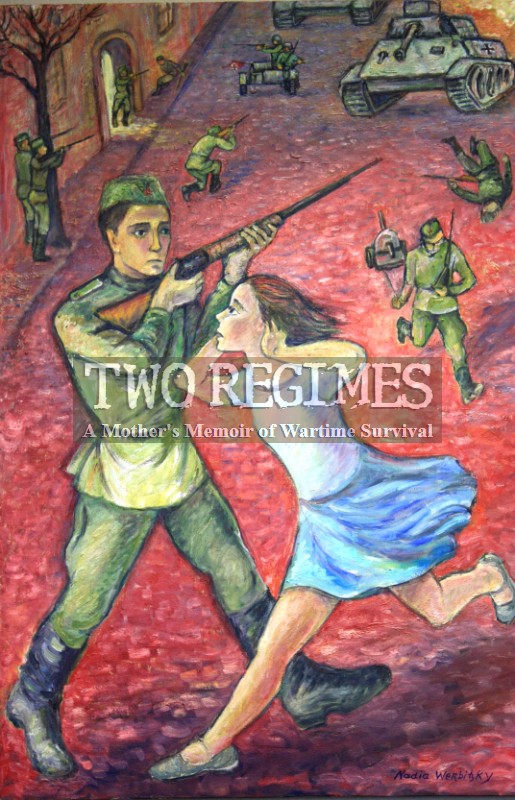
(This passage is from the 14th section of the High School Exhibition)
We continued to work digging trenches. It became clear that we were running out of time and would be unable to dig around the entire city. While we worked, air battles raged above our heads and we were shot at. Fortunately, none of the workers had yet been wounded. The city was soon surrounded by the Germans.
Twenty or so soldiers ran down our street and everything grew quiet. Someone started firing a cannon in the city park, but after two shots there was silence. The dwellers crawled out of their homes, crowded around in the yards, on the street, and by the gates. People started talking, throwing out opinions without much substance, and it grew into such a racket that it was difficult to make sense of what was being said—one report contradicting another.
The troops finally passed by; the shooting ceased; people began walking up and down the street. My daughter ran up to me. “Mommy, the girls are going to look in on the stores. Maybe there is some bread left. Can I go?” “Go ahead, but come right back.” The store was around the corner. Just as they turned the corner, I saw them running back. “Mommy there is a German soldier on a bicycle.” (It was a motorcycle.) This was a sign that the Germans took the city without a battle. Everyone breathed a sigh of relief.
Glossy print (18″ x 24″)
$35.00
Canvas print (36″ X 24″)
$450.00
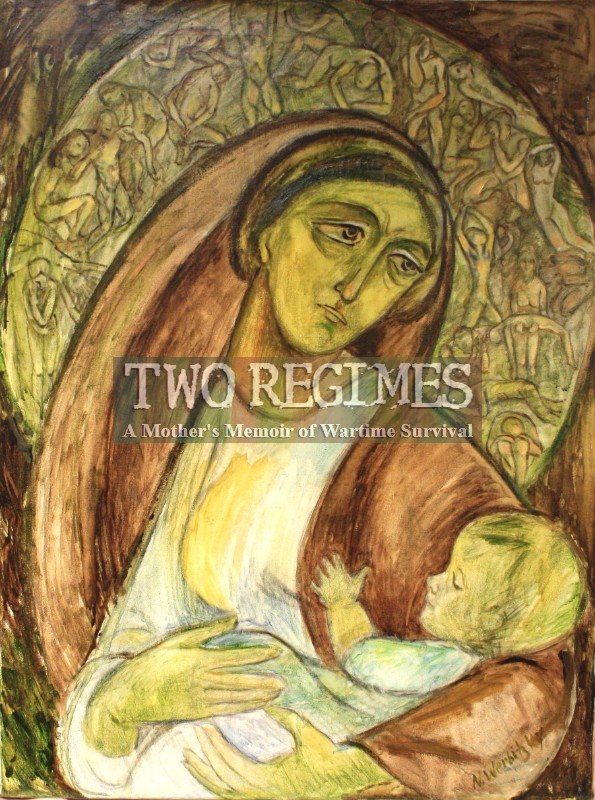
(This passage is from the 9th section of the High School Exhibition)
This storm, too, had passed. Life moved along swiftly. Before one had time to think of today, the concerns of the next day overtook us. The arrests continued. The Greeks and the Ukrainians were labeled as “enemies of the people” and taken away. Then the engineers (those “saboteurs and spies”) were arrested, followed by bank directors and their assistants, office workers, school principles, and many others. I, too, had to bid farewell to my husband. We shall meet again at God’s throne. Forgive me and farewell…
Glossy print (18″ x 24″)
$35.00
Canvas print (32″ X 24″)
$420.00
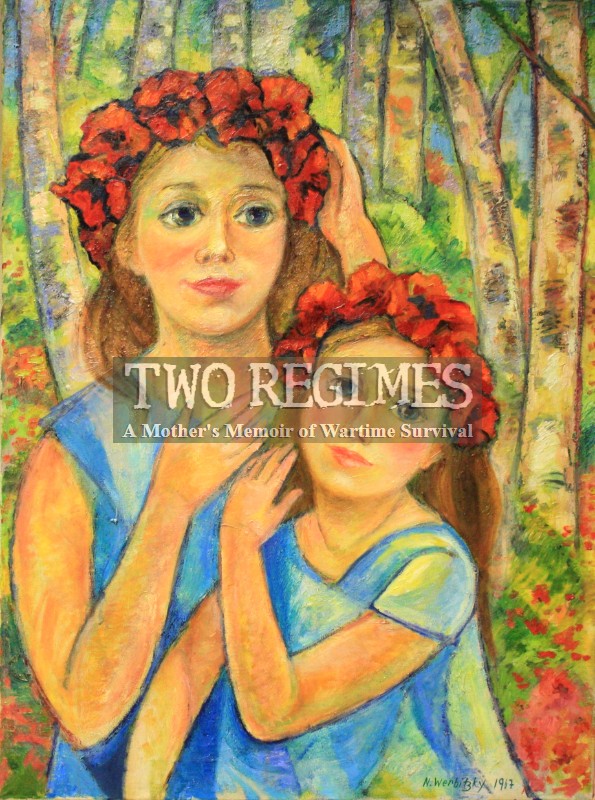
Glossy print (18″ x 24″)
$35.00
Canvas print (32″ X 24″)
$420.00
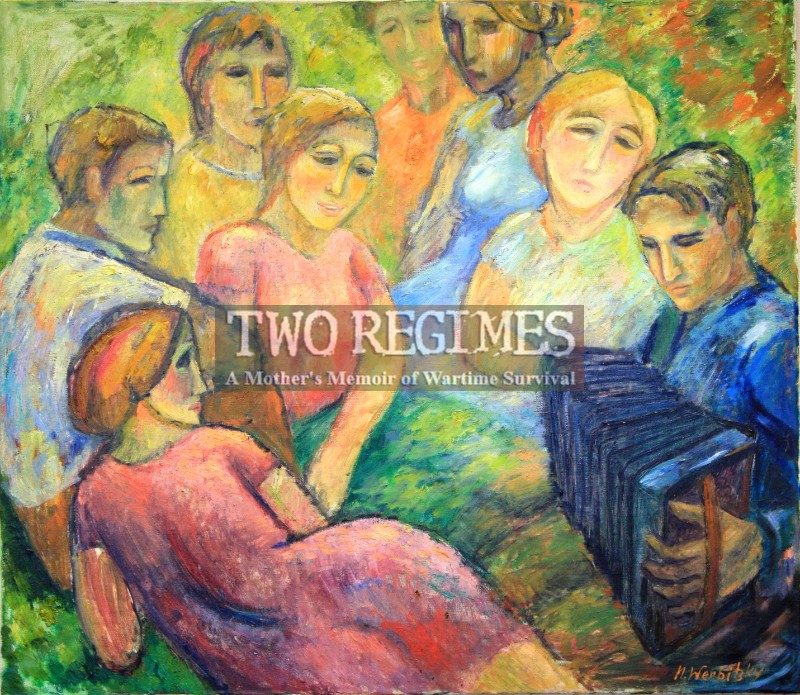
(This passage is from the 5th section of the 5th Grade Exhibition)
Most of the burden of providing for the family fell on the backs of women. They worked in the factories and offices, and obtained and prepared food and clothing. Although burdened by the responsibility for raising a family, we women somehow adapted and learned to live one day at a time. Sometimes we would get to play cards or dominoes, or just fool around and, perhaps sing some songs in harmony.
Glossy print (18″ x 24″)
$35.00
Canvas print (28″ X 32″)
$450.00
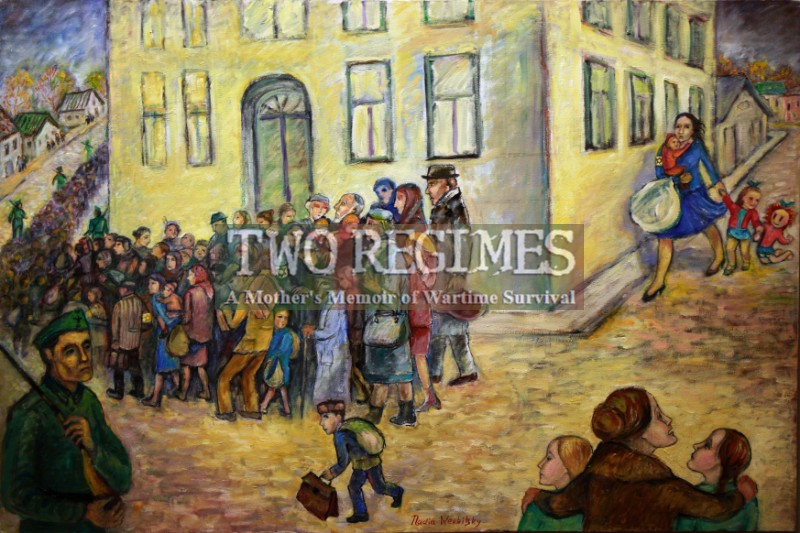
(This passage is from the 24th section of the Museum Exhibition)
Up to now the Jews had been left alone and walked about freely, although the authorities were keeping track of them. On a certain day, old man Gorlin, who had been a neighbor, came knocking on my door and informed us that the Germans had ordered the Jews to pack up their belongings and prepare to leave. He shared the kitchen with us. On the chance that he would return, he asked us to watch his room and not allow anyone in.
By evening of the same day we watched as they were led down the street toward the military barracks outside of the city. By the time we ran outside the first column had already passed the house. In front were the rabbis, the doctors and their families, and the Jewish intelligentsia. Next were the elderly, supported under the arms. The sick were on stretchers, and the children walked along, carrying knapsacks and small bundles. The procession moved very slowly.
My children ran to say good-bye to their classmates: their best friend Rusia Halperin, their favorite teacher Bertha Vladimirnova, and other teachers. After the last column passed and the convoy had all but disappeared from view, we saw a young woman running with two children, desperately trying to catch up. She held an infant under one arm; clutching her other hand was a three-year-old girl dragging a large doll. The guards had apparently forgotten about them. The doll was slowing them down, so the mother grabbed the girl with the doll and placed her on top of a bundle that was tied to her arm. Then she continued running, trying to catch up with her people.
It was difficult to believe that they would shoot down seven and a half thousand people for no reason, but several days later they were executed and buried in those same trenches that we had dug around the city before the Germans arrived. Apparently, many of those buried were not killed because the earth continued to move for some time afterward.
A vile, inhuman, and criminal act had taken place in history.
Glossy print (18″ x 24″)
$35.00
Canvas print (24″ X 36″)
$450.00
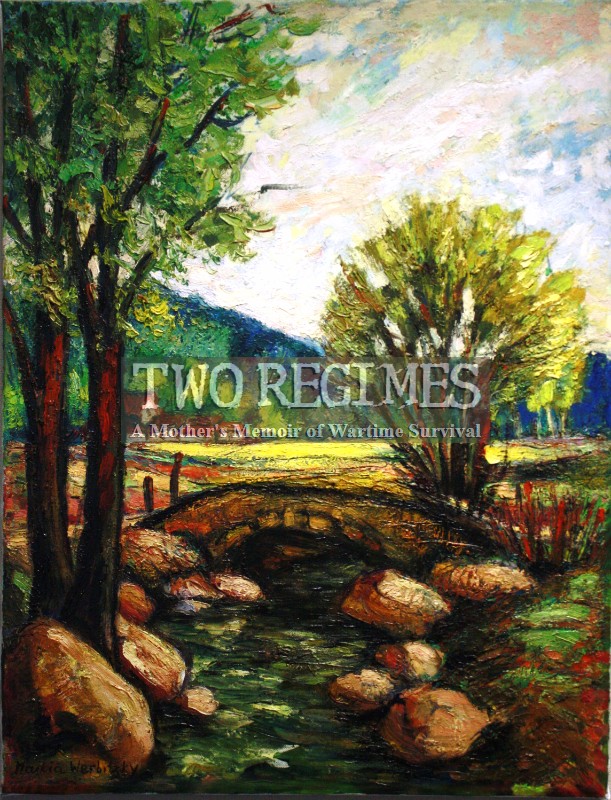
(This passage is from the 5th section of the 8th Grade Exhibition)
With my children, I moved to Mariupol where my widowed father was living. Mariupol was the main city in our region. The rural council assigned to our office was known as the “Periphery.” All the farmers living on the periphery, whether they owned livestock or not, were expected to contribute a precise amount of meat to the government agency. In addition, the state took their surpluses, and levied fines down to the last cow or goat. They were labeled as “unwilling and evil tax evaders.” .
Glossy print (18″ x 24″)
$35.00
Canvas print (26″ X 20″)
$460.00
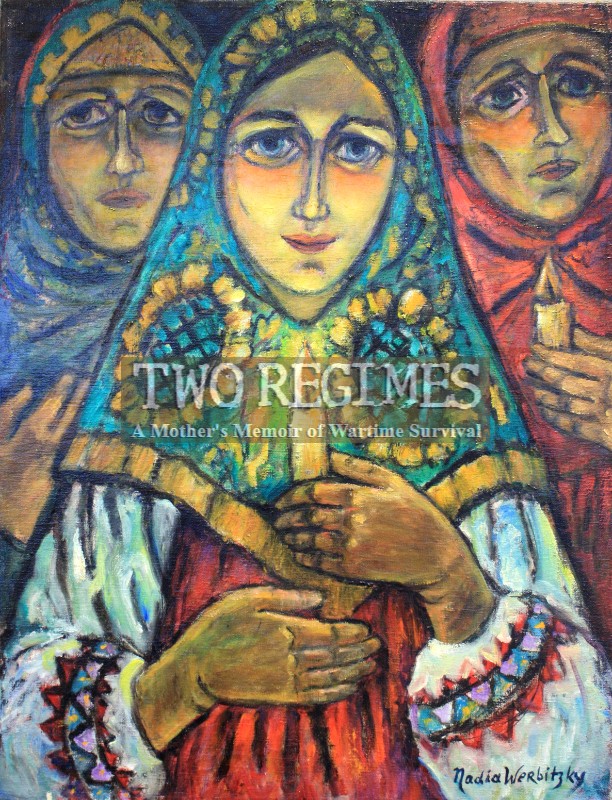
(This passage is from the 1st section of the Museum Exhibition)
This is the story of Teodora Verbitskaya’s life from 1927 to 1945. She was a young mother trying to protect her children from Stalin, the German invasion, the murder of 7,500 Jews (friends and neighbors) from Mariupol, Ukraine, by the Nazi death squads, and then Teodora and her daughters forced deportation to Germany to slave labor camps under Hitler. Finally, they were rescued and liberated by US soldiers.
The story is from the book “Two Regimes – A Mother’s Memoir of Wartime Survival” by Teodora Verbitskaya who is the mother of the Nadia Werbitzky, a professional artist.
No one posed for the artist, every face you see is of a person who lived and breathed on this earth. The following are shared memories of mother and daughter.
Glossy print (18″ x 24″)
$35.00
Canvas print (26″ X 20″)
$460.00
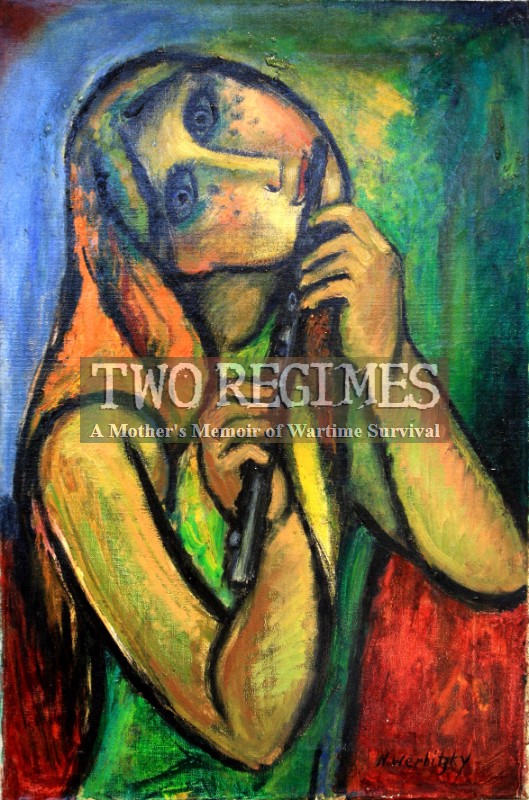
Glossy print (18″ x 24″)
$35.00
Canvas print (24″ X 16″)
$400.00
